Should John Paul II be made a saint? The case for and against
John Paul II is set to be canonised on Sunday. Is it too soon to make the divisive pope a saint?
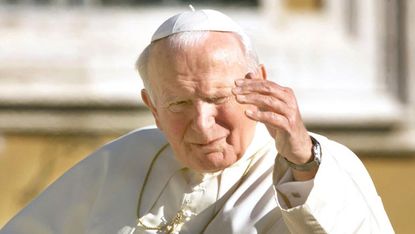
FLORIBETH MORA was languishing in hospital after suffering a brain aneurysm when her gaze settled on a picture of the late Pope John Paul II in a newspaper by her bed. The image came to life, she says, and urged her to "stand up", telling her: "Don't be afraid". Mora did as the picture said, according to the Daily Mail, and miraculously her aneurysm disappeared.
This is the story that fast-tracked John Paul II towards canonisation. On Sunday, the late pope will be made a saint in a ceremony at the Vatican, just nine years after he died. Many candidates wait for hundreds of years, and nobody has been canonised more quickly.
Below we examine the cases for and against the canonisation of the controversial figure of Pope John Paul II.
Subscribe to The Week
Escape your echo chamber. Get the facts behind the news, plus analysis from multiple perspectives.

Sign up for The Week's Free Newsletters
From our morning news briefing to a weekly Good News Newsletter, get the best of The Week delivered directly to your inbox.
From our morning news briefing to a weekly Good News Newsletter, get the best of The Week delivered directly to your inbox.
The case for canonising Pope John Paul IISainthood is "the most democratic process in the catholic church", says the Boston Globe. It begins at a grass-roots level and requires significant "public devotion". The popularity of John Paul II has never been in doubt, and was evident from the moment he passed away, when crowds chanted "Santo subito!", or "sainthood now," at his funeral Mass. John Paul II's broad popularity led his successor, Benedict XVI to waive the usual five-year waiting period so his sainthood could be fast-tracked.
In a move some regard as an effort to maintain political harmony within the church, John Paul II will be canonised alongside another popular former pope, John XXIII. Many see the twin-canonisation as a peacemaking gesture by Pope Francis to try to bring together the liberal side of the church, which identifies with John XXIII, with the conservative one, which favours John Paul II.
Although John Paul II is regarded as a conservative force within the Catholic Church, many people celebrate his broad moral leadership, including his role in the downfall of communism and his simultaneous criticism of the excesses of capitalism.
Many people also praised his sense of duty. John Paul II suffered a long, slow and very public decline in health. In 2001, after years of speculation, it was finally confirmed that the pope was suffering from Parkinson's disease. Rather than stepping down, John Paul II chose to remain as the head of the church until his death in 2005.
The most frequent criticism levelled against John Paul II was that he ignored allegations about sexual abuse within the church, particularly in the case of Marcial Maciel, the Mexican founder of a powerful Catholic movement. But at a Vatican press conference this week, papal spokesman Federico Lombardi told the Irish Times that sainthood did not mean perfection.
"Of course in a 27-year long pontificate, there are going to be controversial issues," Lombardi said. "The point is that the church sees the saint as a great model, someone who bore witness to the Christian life in an outstanding way... but that does not mean that he was perfect in every single thing he did."
The case against canonising Pope John Paul IICritics say that it is impossible for supporters of John Paul II to sweep the sexual abuse scandal under the carpet. The Independent says that fact that he and his top advisers failed to grasp the severity of the problem until the end of his 26-year papacy "remains a stain on his legacy".
Juan Vaca, who claims he was one of Marcial Maciel's victims, says he cannot understand the canonisation of a pope who oversaw so much abuse.
"I feel once more outraged, furious with feelings of deception and rebellion at the circus process to make 'saint' a pope who did nothing to preserve the Catholic Church and society from the horrendous crisis inflicted upon them by the Catholic clergy sexual abuse," Vaca said.
Sainthood is too high an accolade to be given to someone so mired in controversy, says Maureen Dowd in the New York Times: "The church is giving its biggest prize to the person who could have fixed the spreading stain and did nothing," Dowd writes.
Kenneth Briggs, a noted writer on religion agrees. Unlike John XXIII, John Paul II has a "cloud hanging over his papacy", Briggs says.
John Thavis, a Vatican specialist and author of The Vatican Diaries tells the Daily Beast that the Catholic Church now faces a huge public relations challenge. On the one hand, the Vatican wants to highlight John Paul II's achievements and acknowledge his broad popularity, but on the other, it wishes to emphasise that his canonisation should not be seen as an endorsement of every decision he made. "In other words," Thavis says, "canonisation is supposed to be about personal holiness, not papal performance. But that is precisely how many people view it".
Create an account with the same email registered to your subscription to unlock access.
Sign up for Today's Best Articles in your inbox
A free daily email with the biggest news stories of the day – and the best features from TheWeek.com
-
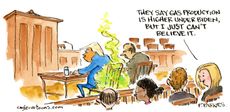 Today's political cartoons - April 27, 2024
Today's political cartoons - April 27, 2024Cartoons Saturday's cartoons - natural gas, fundraising with Ted Cruz, and more
By The Week US Published
-
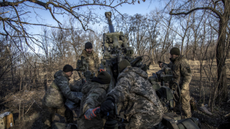 Aid to Ukraine: too little, too late?
Aid to Ukraine: too little, too late?Talking Point House of Representatives finally 'met the moment' but some say it came too late
By The Week UK Published
-
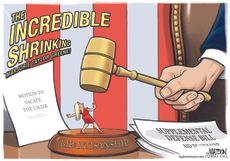 5 generously funny cartoons on the $60 billion foreign aid package
5 generously funny cartoons on the $60 billion foreign aid packageCartoons Artists take on Republican opposition, aid to Ukraine, and more
By The Week US Published
-
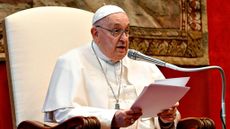 The potential consequences of Pope Francis' call for a ban on surrogacy
The potential consequences of Pope Francis' call for a ban on surrogacyTalking Point Francis called the practice 'despicable' and a 'commercialization' of pregnancy
By Justin Klawans, The Week US Published
-
 The Vatican's same-sex blessing approval: What is Pope Francis doing?
The Vatican's same-sex blessing approval: What is Pope Francis doing?Today's Big Question The pope rocked the Catholic world by giving the green light to blessing same-sex couples, with plenty of caveats
By Peter Weber, The Week US Published
-
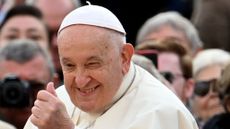 The Vatican half-embraces transgender Catholic godparents, wedding witnesses
The Vatican half-embraces transgender Catholic godparents, wedding witnessesUnder the Radar Pope Francis signed off on a series of clarifications about the roles LGBTQ Catholics can play in the church, with ample theological fine print
By Peter Weber, The Week US Published
-
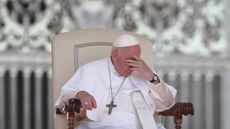 The Pope, the ‘false prophet’, and the battle for Argentina
The Pope, the ‘false prophet’, and the battle for Argentinafeature Opinion has been split on whether the pontiff's intervention into politics in his home nation is appropriate
By Rebekah Evans Published
-
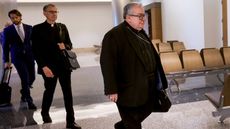 Rebellious nuns ban Texas bishop from monastery in chastity row
Rebellious nuns ban Texas bishop from monastery in chastity rowSpeed Read Wheelchair-using Mother Prioress has been accused of ‘sexting’
By Chas Newkey-Burden Published
-
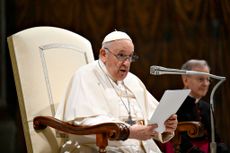 Pope Francis investigates Texas bishop, accepts early resignation of embattled Tennessee prelate
Pope Francis investigates Texas bishop, accepts early resignation of embattled Tennessee prelateSpeed Read
By Peter Weber Published
-
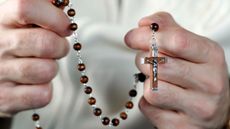 QR codes could reveal sex-offending French priests
QR codes could reveal sex-offending French priestsSpeed Read Move by Catholic Church denounced as a ‘publicity stunt’ by sexual abuse survivors’ group
By Chas Newkey-Burden Published
-
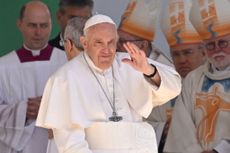 Pope Francis is involved in 'mission' to bring peace to Ukraine
Pope Francis is involved in 'mission' to bring peace to UkraineSpeed Read
By Catherine Garcia Published